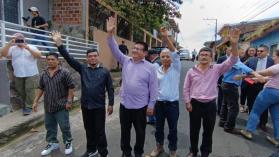Featured Article: Workers win $1.5 million after El Salvador factory closes to dodge collective bargaining
This article reposted from: The International Union League for Brand Responsibility
Here, we translate a report from the El Salvador-based Center for Labor Studies & Support (CEAL in Spanish) on an important victory by ex-workers of Manufacturas Del Río. As CEAL had reported previously, the factory suddenly shut down in January without paying nearly $1.5 million (USD) owed to its 1,066 employees in wages, benefits, and severance. The workers sewed products for Hanes, Fruit of the Loom, Lacoste, Levi Strauss, and Adidas. Their union is a founding member of the Union League and joined the founding congress of the Fruit of the Loom Union Network. In El Salvador, a country where not a single apparel factory has signed a union contract, the factory's closure is widely understood as cynical retaliation against workers who dared to claim their legal right to collectively bargain. (Photo: Elected leaders of workers' union at Manufacturas Del Rio during a meeting at CEAL.)
This past Saturday, July 12, 2014, while the world's attention focused on the end of the World Cup in Brazil, the first payments were made over a thousand workers of the Manufacturas Del Rio (MDR-CCC) factory, which was owed for the time workers had worked — some had worked there for 15 years. The company closed on January 7 without notice, in the middle of a process of collective bargaining that had started two months earlier.
In a bulletin to workers, the STIT union (affiliated to the FUERSA federation, the Salvadoran Social & Union Front, and the International Union League) said that before the closing, they were fighting to negotiate a collective bargaining agreement in order to win better working conditions for everyone, including severance benefits. The union mentioned that they submitted their proposed collective bargaining agreement to the Labor Ministry on November 1, 2013, but the company was unwilling to negotiate the union contract even though they had the means [to improve working conditions]. When the company illegally closed on January 7, 2014, the union demanded 100% of the severance benefits, and made this demand to the multinational brands (Fruit of the Loom, Hanesbrands Inc., Levi Strauss, Lacoste, and Adidas) and the owners of MDR-CCC, the Kaltex-Argus textile group, to jointly assume their responsibility. The STIT union said that the procedures at the Attorney General's office, the courts, and other legal authorities in El Salvador were all necessary, but not sufficient to acheive their goal, and so they had to launch a multinational campaign that included the following components:
» Filing complaints with the Worker Rights Consortium (WRC) in the U.S. to inform customers of the brands about the illegal and irresponsible closure of MDR-CCC.
» Pressuring Argus' owners in Miami and Nicaragua to take responsibility. For that, we were supported by the union SEIU 32BJ, the U.S. student organization USAS, and the Salvadoran embassy in Managua.
» Pressuring Kaltex, Argus' partner in Mexico, to assume their responsibility. For that, we were supported by student activists at the UNAM university, the Mexican electrical workers' union SME, and the Center for Labor Research & Consulting (CILAS).
» Reporting to Adidas' shareholders in Germany about the closure of MDR (the factory sewed Adidas products for 10 years), for which we were supported by the German group Christian Romero Initiative (CIR) and Estela Ramirez, the Chairperson of the League and a Salvadoran union leader.
The STIT union has said the company is committed to complete, in a timely manner, the payment of the amounts calculated by the Labor Ministry regarding the debts to workers, which is recognized as their "moral commitment" to the workers in an agreement with the union, as well as completing their contributions to workers' Social Security and pension funds through the date of the closure.
Despite the anti-union attitude of export factories in El Salvador that has once again been revealed, the achievement of financial obligations through coordinated solidarity and international pressure is an important precedent for labor struggles by workers in the Salvadoran factories, on the read to a complete realization of the right to collective bargaining.

 "I am a CISPES supporter because continuing to fight for social justice and a more people-centered country means continuing the dream and sacrifice of thousands of my fellow Salvadorans who died for that vision.” - Padre Carlos, New York City
"I am a CISPES supporter because continuing to fight for social justice and a more people-centered country means continuing the dream and sacrifice of thousands of my fellow Salvadorans who died for that vision.” - Padre Carlos, New York City

